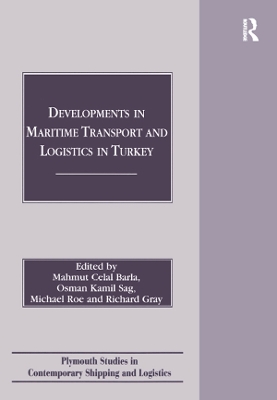Plymouth Studies in Contemporary Shipping and Logistics
3 total works
Developments in Maritime Transport and Logistics in Turkey
by Mahmut Celal Barla, Osman Kamil Sag, and Richard Gray
Published 25 September 2001
Turkey is one of the largest and most important shipping and logistics centres in the world. This edited collection brings together industrialists actively involved in the shipping trade with an interdisciplinary team of academics from the region to provide a unique, broad perspective on the industry as a whole. Using Turkey as an in-depth case study, the volume examines issues such as port economics and policy, training and education, ship finance, containerisation and maritime policy in general. This is a useful reference for professionals and academics in both shipping and logistics.
This text focuses on one geographical and economical area - the Asia-Pacific region, on one type of decision makers - commercial shipowners, and on one type of business strategy - corporate level strategy, to show economic change and how organizations manage that change. This book discusses the challenges that shipowners face to take advantage of that growth. It also looks at the lack of information on strategic decision making that could assist the shipowners in taking advantage of the economic situation. The chapters cover the types of business strategies available and how to select the criteria for selecting one of those strategies.
Road Freight and Privatisation
by Nabil Abdel-Fattah, etc., Richard Gray, and Sharon Cullinane
Published 30 June 1999
This work examines both successes and failures of privatization and seeks to adopt a critical approach. The very idea of privatization has been called into question by some commentators, particularly in the context of transport, which often has prominent environmental and social factors to be taken into account. For this reason, this book devotes a chapter to the external environmental and social costs associated with road haulage and its privatization. It can also be seen as part of the increasing body of published work on business logistic and supply chain management. There has been a rapid growth of interest in logistics in recent years as manufacturers, retailers and other members of the supply chain appreciate the benefits of an integrated approach to production, the management of inventory, customer service and transport, particularly when associated with international distribution. The globalization of international business and its supply chains has led to a world-wide demand for higher quality freight transport services by all modes of transport.
Most of the literature on logistics is associated with developed countries, particularly in North America and Western Europe, and there is a shortage of published work on logistics for developing countries, which are, nevertheless, part of the same global supply system. Poor transport systems in developing countries reduce the effectiveness of international supply chains and, consequently, the attractiveness of such countries for general industrial investment by overseas corporations.
Most of the literature on logistics is associated with developed countries, particularly in North America and Western Europe, and there is a shortage of published work on logistics for developing countries, which are, nevertheless, part of the same global supply system. Poor transport systems in developing countries reduce the effectiveness of international supply chains and, consequently, the attractiveness of such countries for general industrial investment by overseas corporations.


